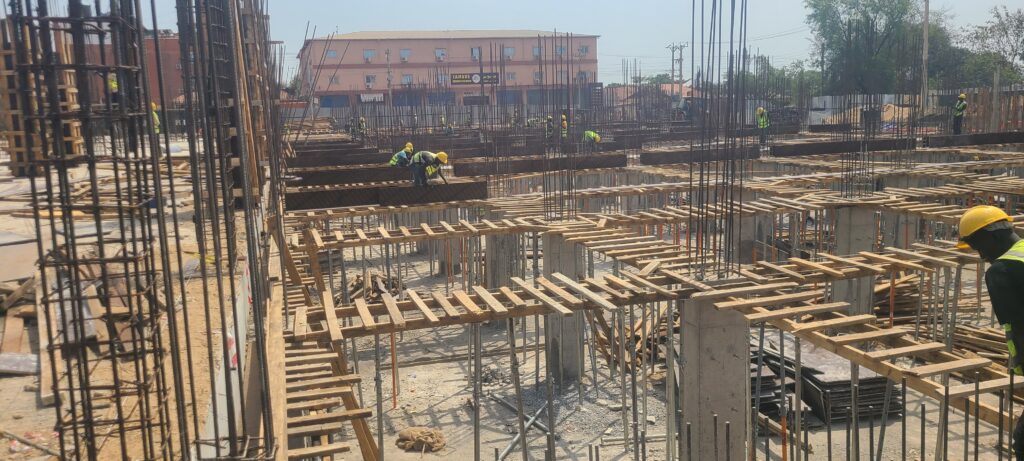The chairperson of Central Equatoria State Chamber of Commerce, Robert Pitia, has expressed disappointment over the revision of the Juba Mall construction plan, from a three-storey structure with a basement, to a single-storey design.
This change has raised concerns about whether the mall would accommodate all the 210 traders who lost their spaces due to the construction.
Currently being constructed on 7,200 square meters on the southern side of the Central Bank premises, the US$6 million project is funded by the African Development Bank, through the Food and Agricultural Organization (FAO), to boost agricultural productivity and trade.
Addressing journalists on Tuesday, during a visit to the construction site, Pitia said it would have been good to inform the business people about the new plan.
“We are also raising a concern because the design of the project is G plus 3, and the basement, and they told us that the budget for this project is US$6 million. Unfortunately, this year we realized that the project is being changed to G plus 1 and basement. If there is any change, why are they not informing us?” he posed.
“From the beginning, they told us that the project is going to be G plus 3, and then they change it to G plus 1. These are the questions that we are asking, we need to know,” he went on.
Pitia is now demanding a written commitment from the Juba City Council and FAO that the displaced vendors will be given space.
The Chamber of Commerce boss said that before the project started, the women vendors did not want to vacate, because they were concerned that after completion, they may not be accommodated.
Pitia said the business people did not trust both the Juba council and FAO, but the Chamber of Commerce convinced them that there would be no problem.
He said they were demanding a letter of commitment from FAO and the Juba City Council that upon the project completion, the place would be handed back to the people who were doing business there.
The response they got from the Juba City Council, he went on, was not convincing, hence their reaching out to FAO too.
Pitia disclosed that according to an agreement between the former Mayor of Juba, Michael Ladu AllahJabu, and FAO, the displaced vendors were supposed to get US$200 compensation each as they awaited accommodation in the mall. However, that did not happen.
He was also concerned that with the change of the design, the mall would not be enough to accommodate all the traders.
AllahJabu admitted that the plan was changed because the first one did not have a basement, which did not align with the mall designs across the region.
He said before he left office, the city council together with FAO adapted the new plan, citing that the floors that are supposed to be up were catered for by the basement.
“We came to realize that we needed a basement because in modern cities, you cannot build a big mall of almost 10,000 square meters without an underground parking. So, we included the basement which can accommodate 120 cars,” he said.
When asked about the US$200 compensation for each vendor, AllahJabu said he left office before the money was released, denying knowing anything after.
The construction that began last year is expected to be completed in August this year.




